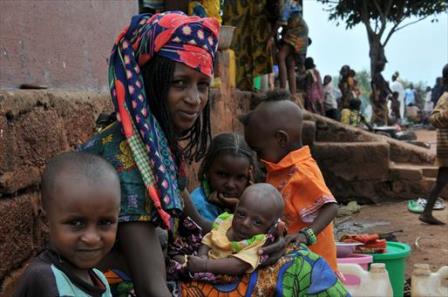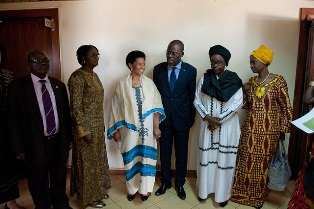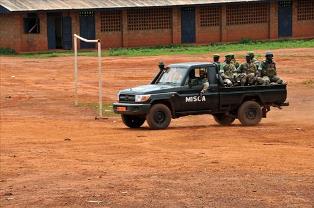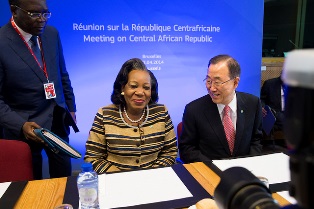
May 19, 2014World Watch Monitor
The President of the Central African Republic has replaced the Christian Prime Minister with a Muslim as part of a peace deal to end deadly violence that has ravaged the country for more than a year.
Interim President Catherine Samba-Panza on Sunday replaced Prime Minister Andre Nzapayéké with Mahamat Kamoun. Nzapayéké stepped aside to make room for a consensus government, a condition specified in the cease-fire between Séléka rebels and the vigilante anti-Balaka. The deal was signed last month in Brazzaville, in the Republic of the Congo.
Kamoun, 53, is the first Muslim to serve as Prime Minister in the Christian-majority CAR.

Prime
Minister
Andre
NzaPayeke
(third from
right)
with UN
Women
Executive
Director
Phumzile
Mlambo-
Ngcuka (third
from left)
and Special
Representative
of
the African
Union
for Women,
Peace and
Security
Bineta Diop
(second from
right).
Bangui, CAR
May 26, 2014UN Photo / Creative Commons / Flickr
The move is neither unexpected nor unwelcome, said Rev. Nicolas Guérékoyame, President of Evangelical Alliance in CAR, and a member of the Religious Platform – a group of Christian and Muslim leaders.
”We have always said religion should not be used for political purposes in CAR,” Guérékoyame told World Watch Monitor. “Thus, for now we do not know the reasons that led the President to make this appointment.”
”The only criterion that matters for us, is a Central African-born citizen, competent, capable to meet the many challenges the country is currently facing, namely insecurity, the return of [internally displaced people], the regular payment of salaries, etc.”
In the Central African Republic, the President is elected and appoints a Prime Minister, who serves at the head of the national Council of Ministers.
An economist, Kamoun served as director general of the treasury to the former President, Francois Bozizé. He served as cabinet chief to the man who drove out Bozizé, Séléka leader Michel Djotodia.
Kamoun played down the role of his religious background, or “confessional criterion,” in his nomination.
“The confessional criterion has played a minor role in my appointment, contrary to what some may think. I see myself as a statesman, an open-minded and unifying man, he said in an interview (Source RFI).
”Therefore, reconciliation is one of the actions that the transitional government is expected to implement at this difficult time in our country. With all Central Africa Citizens, the government and the international community, we will work towards that goal. ”
Kamoun and Samba-Panza, the interim President, now face the task of directing the political transition. The July 23 ceasefire agreement calls on armed groups to repatriate foreign mercenaries within their ranks, and to drop the idea of partitioning the country. The deal also orders combatants back to their barracks, “subject to mobilization of necessary resources.” There is no mention of disarmament.

International
Support
Mission to
the
Central
African
Republic,
MISCA
truck
and
soliders;
CAR.
May 19, 2014
World Watch Monitor
Challenges ahead
The Séléka, who expected one of their group to be appointed Prime Minister, rejected Kamoun’s appointment.
“We have been very disappointed by this appointment,” Séléka spokesman Capt. Ibrahim Nedjad told the BBC. It’s true that Mr. Kamoun worked with former President Michel Djotodia, but Séléka is well organised. Séléka has a political branch.”
The Séléka, however, are no longer a homogenous group. Clear divisions have appeared between political and military leadership, and among several armed groups that were part of the coalition, which Djotodia disbanded in January.
On the ground, the situation remains tense, as the fragile cease-fire has been frequently violated. Séléka accuse anti-Balaka of attacking Muslims in Bambari, Dékoa, Bodo and Batangafo at the end of July. The anti-Balaka has denied involvement in the attack. Last week, heavy fighting between international forces and Séléka fighters in Batangafo, 300 kilometres north of the CAR capital of Bangui, killed 50 Séléka fighters and two international African peacekeeping soldiers, according to media reports.
The Séléka combatants were accused of committing atrocities among civilians, especially Christians, in Batangafo. Pastor Jean Nbefara, 56, with Foursquare Church, was shot dead in his house along with one of his sons.
All Catholic priests serving in the city were transferred to Bossangoa as a result of the violence.
A new transitional government is expected in few days. Amnesty International has expressed concern that militants suspected of serious human rights abuses are seeking positions within the new government, and is asking Samba-Panza to ensure that those suspected of involvement in crimes are not given seats.
Lessons from Rwanda

left
Catherine
Samba-
Panza,
CAR
interim
President
From
right
Ban
Ki Moon,
UN
Secretary
-General.
April 02,
2014
President of the European Council / Creative Commons / Flickr
CAR’s religious leaders visited Rwanda Aug. 7 and 8 to examine progress in conflict resolution made since the 1994 genocide. The delegation included Guérékoyame; Dieudonné Nzapalainga, the archbishop Bangui; and Oumar Kobine Layama, the Imam of Bangui. Each is a member of the Religious Platform.
“We came to visit the memorial [of genocide] in order to assess the scale of the 1994 tragedy in Rwanda,” Nzapalainga told the media. “The international community is urged to act so that what happened in Rwanda never happens again in Africa or elsewhere in the world.”
There are similarities between Rwanda’s tragedy and CAR’s current crisis, he said.
“In Rwanda, ethnicity has been manipulated. In my home country, we took religion as the ‘entry window’ to oppose people,” he said. ”If we are not paying attention, one day, a group will stand up and decide wipe away another. We do not want to be there.”
During the two-day visit, the CAR prelates visited the genocide memorial in Gisozi, a hill overlooking Kigali the capital; and paid respects at a monument where some 280,000 victims of the 1994 genocide are buried.
Background: CAR’s Violent History |
| The Central African Republic has been wracked by violence since December 2012, when a coalition of Muslim-dominated rebel groups under the Séléka banner moved through the country to eventually drive out President Francois Bozizé in March 2013. What followed was 10 months of Séléka violence, much of it directed at Christians, thousands of whom were killed and driven from their homes.
Séléka leader Michel Djotodia took control of a transitional government, but lost control of Séléka soldiers. In December, the UN Security Council authorized the expansion of the African and French military forces then attempting to maintain security in the CAR, and started planning for the possible conversion of those forces to a UN-managed peacekeeping operation. By January 2014, an interim President had replaced Djotodia, the Séléka coalition had been disbanded, and was being pursued by violent vigilante groups known as the anti-Balaka, which originally formed to ward off cattle rustlers and bandits. Many anti-Balaka self-identify as Christian, giving the violence a sectarian appearance. However, many of the same anti-Balaka also embrace animist beliefs, placing them outside Christianity. Leaders of CAR’s Christian denominations have publicly rebuked anti-Balaka violence and rejected their claim to Christianity. Since December 2013, the anti-Balaka have waged a revenge campaign of ethnic cleansing in the west of CAR, as Séléka remnants have retreated to the northeast. Many hundreds of Muslims, as well as non-Muslims, have been killed. According to the UN, nearly 20% of CAR population has been displaced. |